Three Fun Paradoxes Created By Ancient Greek Philosophers To Puzzle Over
AncientPages.com - Ancient Greek philosophers used paradoxes for all sorts of reasons, from sharpening their dialectical skills and showing philosophical opponents were talking nonsense to serious philosophical inquiry – but also for fun.
Some paradoxes were lethal. Philetas of Cos’s epitaph tells us he died tormented by the “liar paradox”. And according to one biographer, Diodorus Cronus killed himself in 284 BC after failing to solve a paradox put to him by fellow philosopher Stilpo of Megara.
The School of Athens by Raphael, (1509–1511). Wiki Commons
These stories are fanciful, but they point to something maddeningly true about paradoxes: there cannot be a single, obvious solution. Sometimes there is no good solution. Sometimes there are too many good solutions. Paradoxes point to conceptual glitches or bugs. How to fix these bugs, or whether they can be fixed, is rarely obvious.
The three paradoxes that follow are some of the best-known examples from Ancient Greece.
1. The liar paradox
“This sentence is false.” Philosophers call that the “liar sentence”. Is it true? If you say “yes, the liar sentence is true”, then things are as it says – yet the liar sentence says it is false.
On the other hand, suppose you say “no, the liar sentence is false”. This means things are not as the liar sentence says. But this is exactly what it says, so in this sense the liar sentence is true.
In short, there are good reasons to say both that the sentence is true and that it is false. Yet no sentence can be both true and false.
This paradox was invented by the philosopher Eubulides of Miletus, who was famous for his paradoxes, in the 4th century BC. His own formulation has been lost, and what I give here is my reconstruction.
The liar paradox alienates us from everyday notions like truth, falsehood and self-referential language. But it also calls into question the idea, presupposed by question-and-answer dialectic (dialogue between people holding different points of view about a subject), that every question can be answered “yes” or “no”. It seems there are good reasons to answer both “yes” and “no” to some questions.
Some philosophers have concluded this means that both “yes” and “no” are good answers to the question “is the liar sentence true?”. They call this a “glut” of good answers. To apply the liar paradox to your life, when you ask or are asked questions, ask yourself: is there more than one right answer?
2. The horns paradox
Have you lost your horns? If you answer “yes”, you must have had horns that you have now lost. If you say “no”, then you have horns that you have not lost. Either way you answer, you suggest you had horns – but that is clearly false.
Questions are a key part of philosophy. But they’re also key to how we get information from other people. The liar paradox highlights that some questions have a more than one good answer. The horns paradox highlights another problem – questions have presuppositions.
If I ask “have you stopped eating meat?”, then I presuppose you no longer eat meat, but that you used to. These questions look like they should have a “yes” or “no” answer, but in fact there is a gap because we could deny the presupposition.
When you ask questions, or are asked questions, first ask yourself: what is being presupposed?
3. The sorites paradox
Here are 10,000 grains of sand. Do I have a heap? Yes, of course. I remove a grain, so now I have 9,999 grains. Do I have a heap? Yes. I remove another grain so I have 9,998. Do I have a heap? Yes.
Losing a single grain does not affect whether I have a heap. But reiterating this 9,997 more times, I have one grain. That should be a heap, but of course it is not. You could argue both that one grain is a heap, and that it is not. But nothing can be both a heap and not a heap.
Another of Eubulides’ greatest hits, the sorites (the “heaper”), uses a heap as an example. But it also heaps question upon question.
This paradox challenges us because some concepts have fuzzy edges. When we plug these fuzzy concepts into a question-and-answer dialectic, there are clear yes-or-no answers at the start and end of the sequence. Ten thousand grains is clearly a heap and one grain clearly is not. But there are no clear yes or no answers for some region in the middle.
The liar paradox suggests there might be gluts of good answers to yes or no questions; the horns that there might be gaps, where neither “yes” nor “no” is the correct answer. But the sorites shows that there may be gaps that come and go, with fuzzy-edged concepts. But how many of our concepts have fuzzy edges? And do fuzzy concepts track a fuzzy world?
Paradoxes highlight glitches in commonplace, everyday activities: asserting truths, asking questions, and describing objects. Thinking carefully about this is fun, certainly. But paradoxes should also make us sensitive to whether every apparently good question has exactly one good answer: some questions have more, some have none.
Provided by The Conversation
This article is republished from The Conversation under a Creative Commons license. Read the original article.
More From Ancient Pages
-
 Vikings Had Dark Humor And Joked Even During Deadly Battles
Vikings | Aug 20, 2024
Vikings Had Dark Humor And Joked Even During Deadly Battles
Vikings | Aug 20, 2024 -
 Erik The Red: Famous Viking Outlaw Who Colonized Greenland And Was Father Of Leif Erikson
Vikings | Jun 16, 2020
Erik The Red: Famous Viking Outlaw Who Colonized Greenland And Was Father Of Leif Erikson
Vikings | Jun 16, 2020 -
 Well Of Urd (Urdarbrunn): Abode Of Fate Goddesses And Powerful Symbol In Norse Beliefs
Featured Stories | Dec 17, 2022
Well Of Urd (Urdarbrunn): Abode Of Fate Goddesses And Powerful Symbol In Norse Beliefs
Featured Stories | Dec 17, 2022 -
 Native Americans’ Visions Of Distant Explorers May Unravel Some Ancient Mysteries Of North America – Archaeological Evidence – Part 2
Ancient Mysteries | Nov 21, 2019
Native Americans’ Visions Of Distant Explorers May Unravel Some Ancient Mysteries Of North America – Archaeological Evidence – Part 2
Ancient Mysteries | Nov 21, 2019 -
 Unusual Underwater Archaeological Discovery In California May Confirm Thousand-Year-Old Legend And Re-Write Ancient History
Featured Stories | Aug 15, 2024
Unusual Underwater Archaeological Discovery In California May Confirm Thousand-Year-Old Legend And Re-Write Ancient History
Featured Stories | Aug 15, 2024 -
 Controversial Discovery Of Rama’s Bridge – A 1,700,000 Year Old Man-Made Structure
Featured Stories | Jun 19, 2014
Controversial Discovery Of Rama’s Bridge – A 1,700,000 Year Old Man-Made Structure
Featured Stories | Jun 19, 2014 -
 Mystery Of The Kusanagi Treasure: The Legendary Sword
Artifacts | Feb 8, 2016
Mystery Of The Kusanagi Treasure: The Legendary Sword
Artifacts | Feb 8, 2016 -
 Boobrie: Shape-Shifting Mythical Horror Bird From Scottish Highlands
Featured Stories | Feb 9, 2017
Boobrie: Shape-Shifting Mythical Horror Bird From Scottish Highlands
Featured Stories | Feb 9, 2017 -
 3,500 Underground Man-Made Maresha/Beit Guvrin Caves And Tunnels In The Holy Land
Featured Stories | Jun 1, 2014
3,500 Underground Man-Made Maresha/Beit Guvrin Caves And Tunnels In The Holy Land
Featured Stories | Jun 1, 2014 -
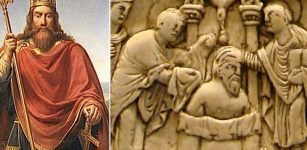 What Was Lex Salica?
Ancient History Facts | Dec 13, 2017
What Was Lex Salica?
Ancient History Facts | Dec 13, 2017 -
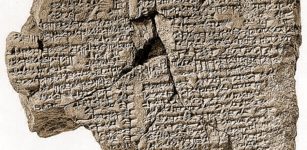 Utukku Lemnutu: Incantations Used As Therapy In Mesopotamia
Archaeology | Oct 25, 2016
Utukku Lemnutu: Incantations Used As Therapy In Mesopotamia
Archaeology | Oct 25, 2016 -
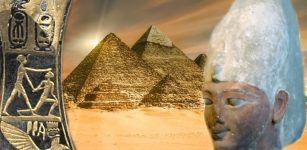 Pharaoh Ahmose I Expelled The Hyksos Invaders And Changed History Of Ancient Egypt
Featured Stories | Mar 16, 2021
Pharaoh Ahmose I Expelled The Hyksos Invaders And Changed History Of Ancient Egypt
Featured Stories | Mar 16, 2021 -
 Glastonbury Tor – One Of The Most Mysterious Sacred Places In England
Civilizations | Aug 30, 2018
Glastonbury Tor – One Of The Most Mysterious Sacred Places In England
Civilizations | Aug 30, 2018 -
 Mysterious Cave Of Prophetess Cumaean Sibyl – Ancient Portal To The Underworld
Featured Stories | Dec 25, 2017
Mysterious Cave Of Prophetess Cumaean Sibyl – Ancient Portal To The Underworld
Featured Stories | Dec 25, 2017 -
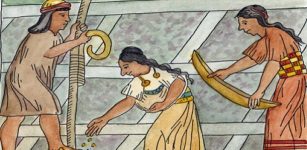 Why Was Ayllu Very Important For The Inca People?
Ancient History Facts | Feb 19, 2019
Why Was Ayllu Very Important For The Inca People?
Ancient History Facts | Feb 19, 2019 -
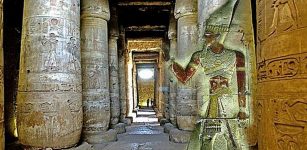 Abydos: One Of The Most Important Cities Of Ancient Egypt
Civilizations | Jul 15, 2016
Abydos: One Of The Most Important Cities Of Ancient Egypt
Civilizations | Jul 15, 2016 -
 Unexplained Ancient Wars In America – Strange Physical Evidence – Part 2
Ancient Mysteries | Oct 4, 2020
Unexplained Ancient Wars In America – Strange Physical Evidence – Part 2
Ancient Mysteries | Oct 4, 2020 -
 Mary Boleyn – King Henry VIII’s Other Woman And Sister Of Anne Boleyn
Featured Stories | Jul 24, 2018
Mary Boleyn – King Henry VIII’s Other Woman And Sister Of Anne Boleyn
Featured Stories | Jul 24, 2018 -
 Monte d’Accoddi – Mesopotamian Ziggurat In Europe Built By King Of Uruk?
Featured Stories | Feb 5, 2018
Monte d’Accoddi – Mesopotamian Ziggurat In Europe Built By King Of Uruk?
Featured Stories | Feb 5, 2018 -
 History Of Bread: Basic Food Of Man In Ancient And Contemporary Cultures Around The World
Ancient Traditions And Customs | Jun 18, 2023
History Of Bread: Basic Food Of Man In Ancient And Contemporary Cultures Around The World
Ancient Traditions And Customs | Jun 18, 2023

